The embargo is not only harming Cuban healthcare. It is also blocking Americans from life-saving Cuban treatments, Natalia Marques reports.
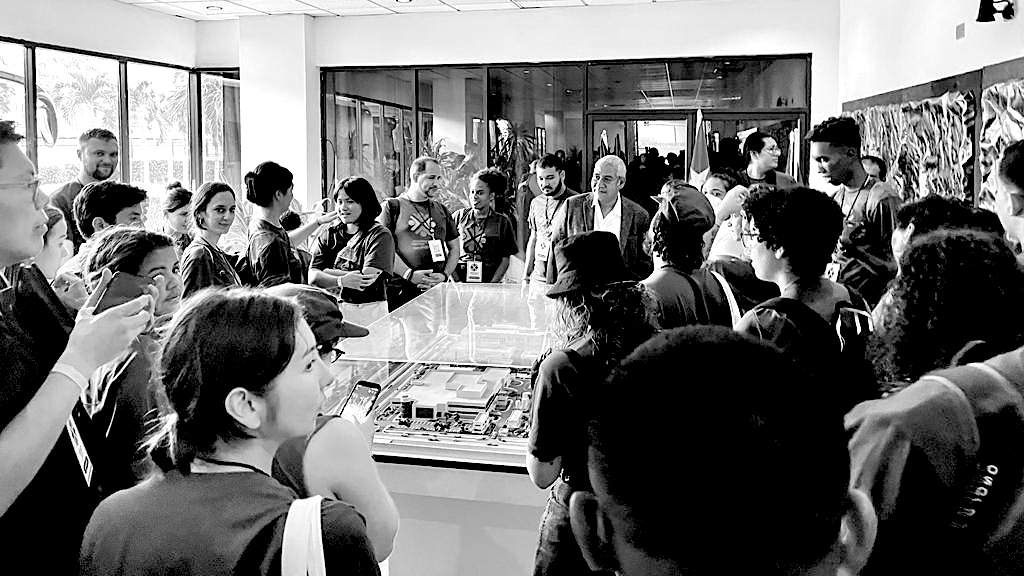
A presentation at the “Building Our Future” conference in November 2022 in Havana. (Julia Dratel, Peoples Dispatch)
By Natalia Marques
Peoples Dispatch
 Scientists in Cuba believe that the breakthroughs they have made in the healthcare and technology sectors should be used to save and improve lives beyond the country’s borders.
Scientists in Cuba believe that the breakthroughs they have made in the healthcare and technology sectors should be used to save and improve lives beyond the country’s borders.
This is why the island nation has developed important scientific and medical partnerships with organizations and governments across the globe, including with those in Mexico, Palestine, Angola, Colombia, Iran and Brazil.
However, such collaborations are difficult due to the blockade imposed on Cuba by the United States, which has now been in place for the last six decades.
In a conference, “Building Our Future,” held in Havana in November 2022, which brought together youth from Cuba and the United States, scientists at the Cuban Center of Molecular Immunology (CIM) said during a presentation that the blockade hurts the people of the United States, too.
By lifting the sanctions against Cuba, they argued, the people of the United States could have access to life-saving treatments being developed in Cuba, especially against diseases such as diabetes, which ravage working-class communities each year.
Diabetes Treatment
Cuban scientists have developed both a lung cancer vaccine and a groundbreaking diabetes treatment. The new diabetes treatment, Heberprot-P, developed by the Cuban Center for Genetic Engineering and Biotechnology (CIGB), can reduce leg amputations of people with diabetic foot ulcers by more than four times.
The medication contains a recombinant human epidermal growth factor that, when injected into a foot ulcer, accelerates its healing process, thereby reducing diabetes-related amputations.
The medication has been registered in Cuba since 2006 and has been registered in several other countries since then. But people in the United States are unable to get access to Heberprot-P.
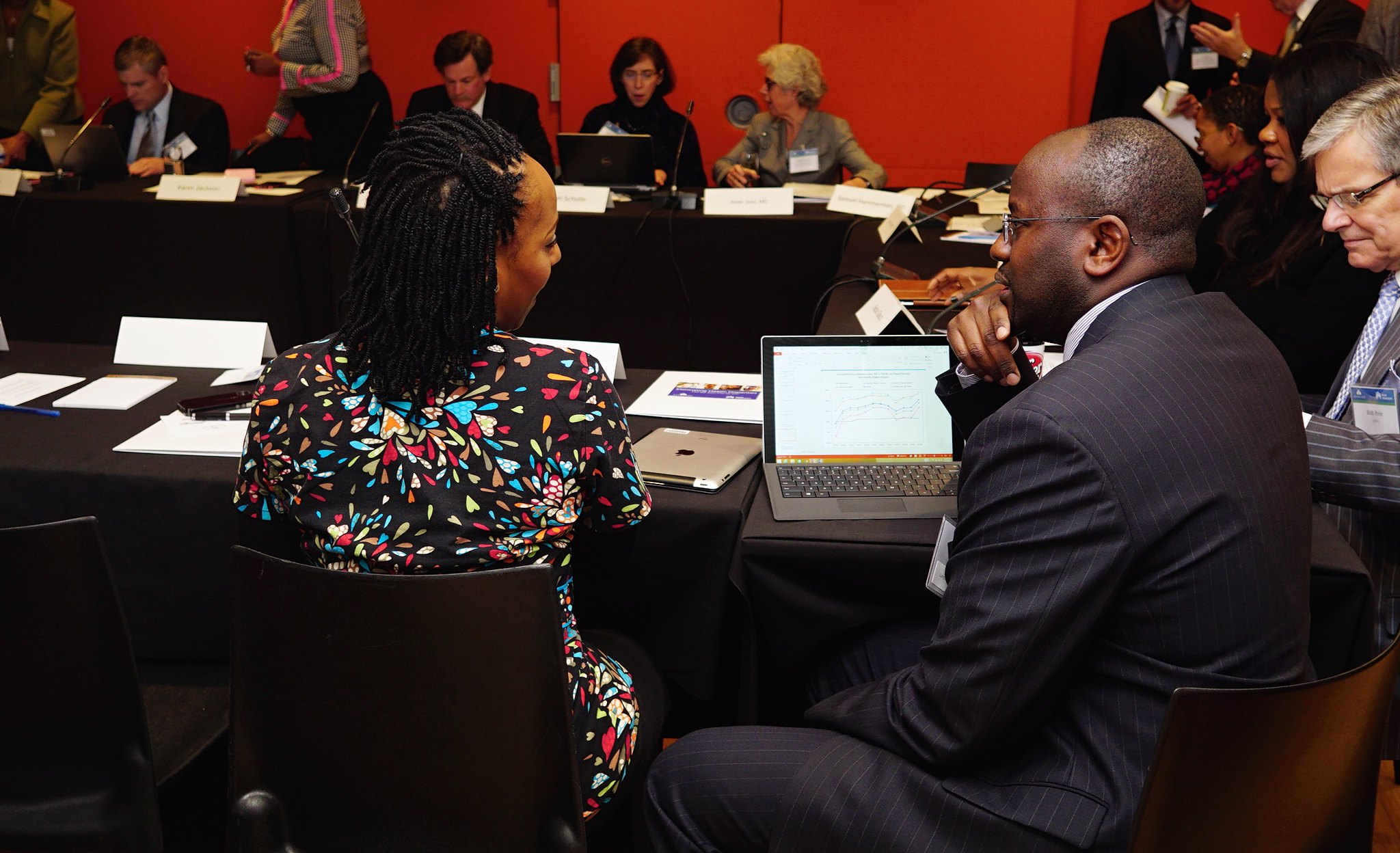
Eliminating Health Disparities event at the Kaiser Permanente Center for Total Health in Washington, D.C., 2014. (Ted Eytan, Flickr, CC BY-SA 2.0)
Diabetes was the eighth leading cause of death in the United States in 2020, according to the Centers for Disease Control and Prevention, killing more than 100,000 patients in that year.
“Foot ulcers are among the most common complications of patients who have diabetes,” which can escalate into lower limb amputations, according to a report in the National Center for Biotechnology Information.
Each year, around 73,000 “non-traumatic lower extremity amputations” are performed on people who have diabetes in the U.S. These amputations occur at a disproportionate rate among Black and Brown people suffering from diabetes. Many point to racial economic disparities and systemic medical racism as the reason for this.
“If you go into low-income African American neighborhoods, it is a war zone… You see people wheeling themselves around in wheelchairs,” Dr. Dean Schillinger, a medical professor at the University of California-San Francisco, told KHN.
According to the KHN article, “Amputations are considered a ‘mega-disparity’ and dwarf nearly every other health disparity by race and ethnicity.”
Support CN’s
Winter Fund Drive!
The life expectancy of a patient with post-diabetic lower limb amputation is significantly reduced, according to various reports.
“[P]atients with diabetes-related amputations have a high risk of mortality, with a five-year survival rate of 40–48 percent regardless of the etiology of the amputation.”
Heberprot-P could help tens of thousands of patients avoid such amputations, however, due to the blockade, U.S. patients cannot access this treatment.
“So after five years [post-amputation], that’s the most you can live, and we are preventing that from happening,” said Rydell Alvarez Arzola, a researcher at CIM, in a presentation given to the U.S. and Cuban youth during the conference in Havana. “And that also is something that could bring both of our peoples [in Cuba and the U.S.] together to fight… to eliminate [the blockade].”
Thus people in the U.S. have a vested interest in dismantling the U.S. blockade of Cuba.
Cuban Healthcare
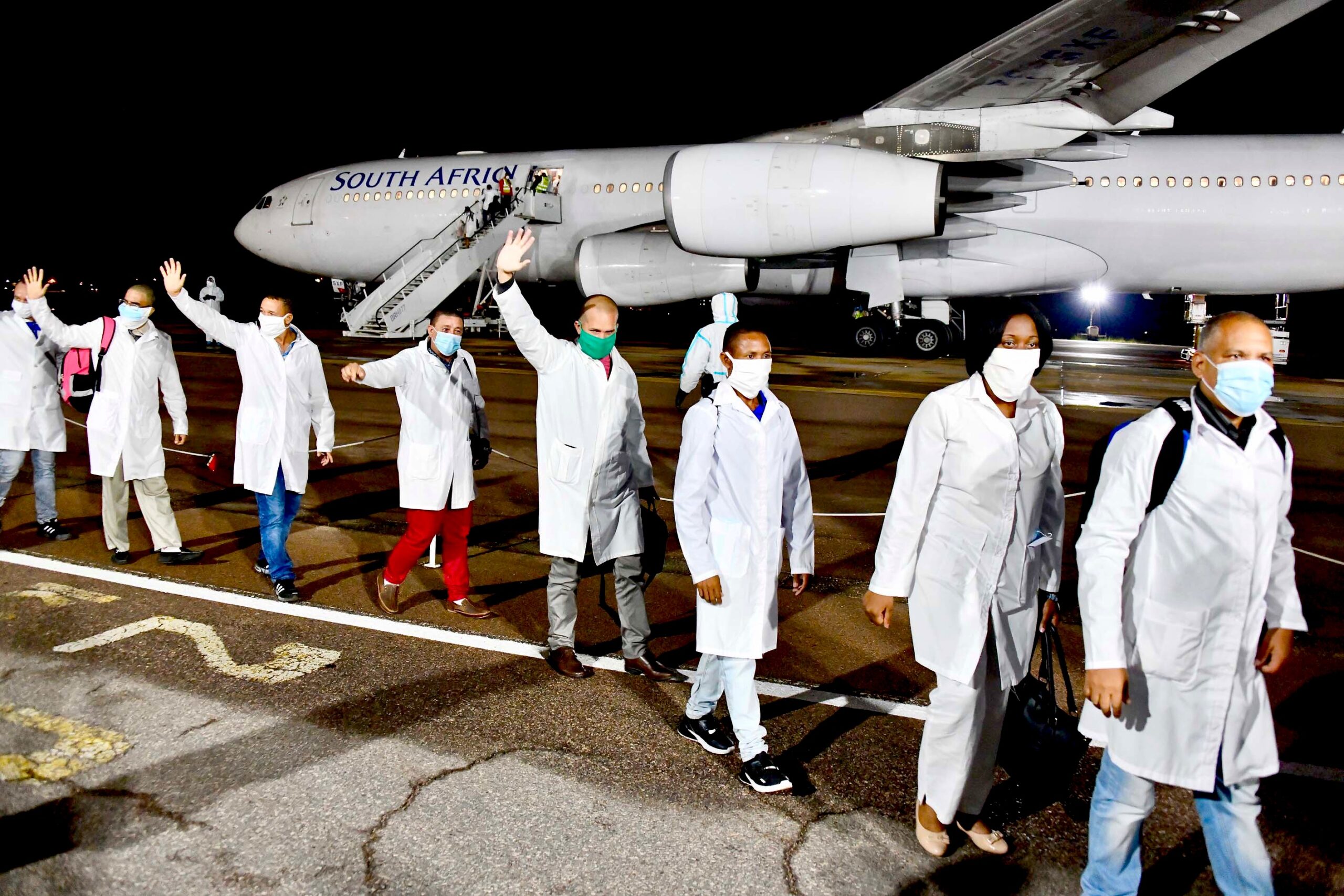
Cuban health specialists arriving in South Africa to help curb the spread of Covid-19, April 27, 2020. (GCIS, CC BY-ND 2.0)
Perhaps one of Cuba’s proudest achievements is a world-renowned healthcare system that has thrived despite economic devastation and a 60-year-long blockade.
After the fall of Cuba’s primary trading partner, the Soviet Union, in 1991, the island saw a GDP decrease of 35 percent over three years, blackouts and a nosedive in caloric intake. Yet, despite these overwhelming challenges, Cuba never wavered in its commitment to providing universal healthcare.
Universal healthcare, or access to free and quality healthcare for all, is a long-standing demand of people’s movements in the United States that has never been implemented largely due to the for-profit model of the healthcare industry and enormous corporate interests in the sector.
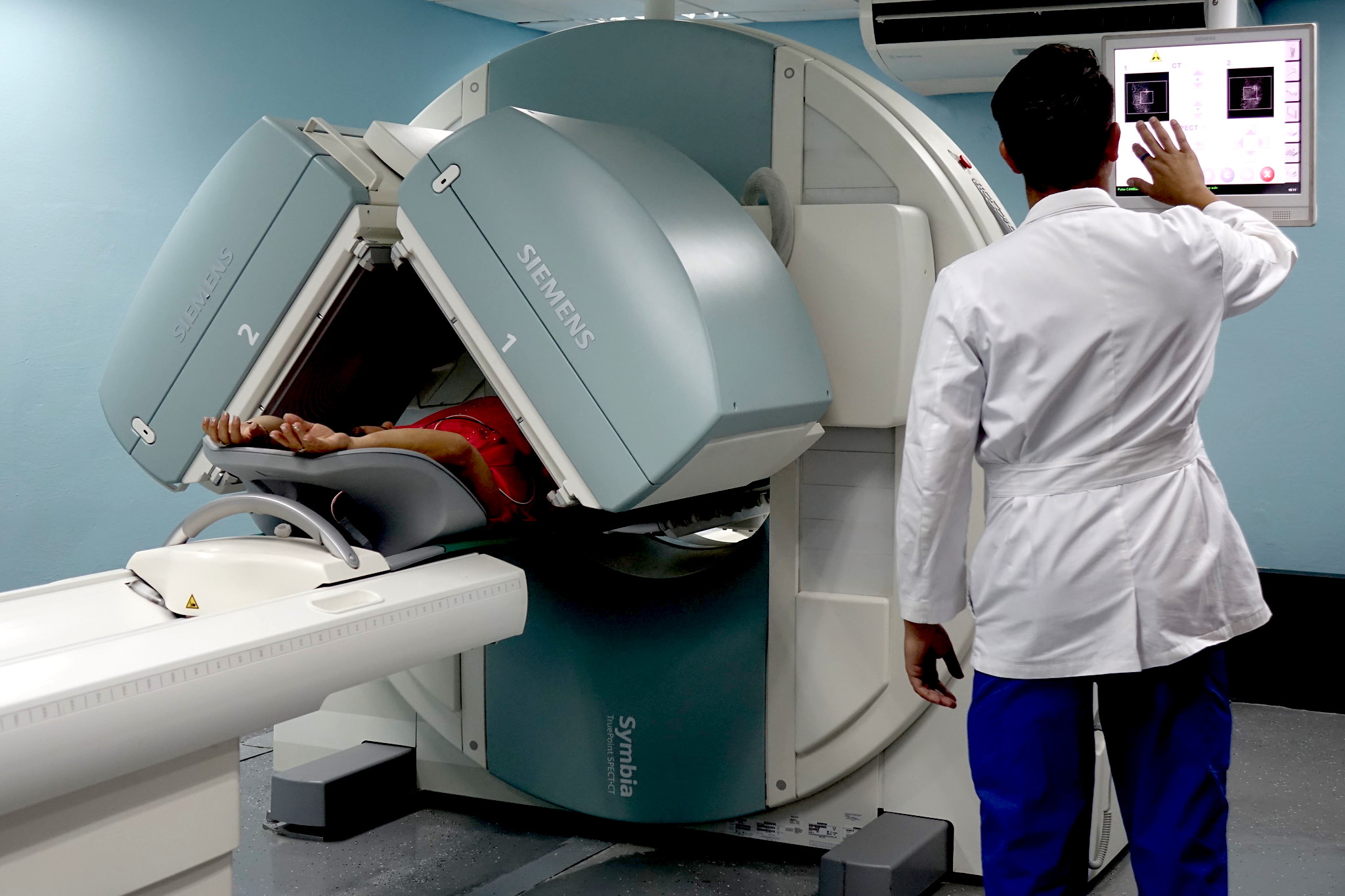
A SPECT CT scan in Havana, May 2018
(Alejandra Silva /IAEA, CC BY 2.0)
As other nations were enacting neoliberal austerity measures, which drastically cut social services in the 1980s and 1990s, Cuba’s public healthcare spending increased by 13 percent from 1990 to 1994.
Cuba successfully raised its doctor-to-patient ratio to one doctor for every 202 Cubans in the mid-1990s, a far better statistic than the United States’ ratio of one doctor for every 300 people, according to a 2004 census.
As the blockade begins its seventh decade, Cuba is not only upholding universal healthcare but also continues to be at the forefront of scientific developments globally.
This was evident during the Covid-19 crisis. Faced with the inability to purchase vaccines developed by U.S. pharmaceutical companies due to the U.S. blockade, Cuba developed five vaccines.
The nation not only achieved its goal of creating one of the most effective Covid-19 vaccines but also launched the first mass Covid-19 vaccination campaign for children from age 2-to-18 years old in September 2021.
Sharing Knowledge Without Restrictions
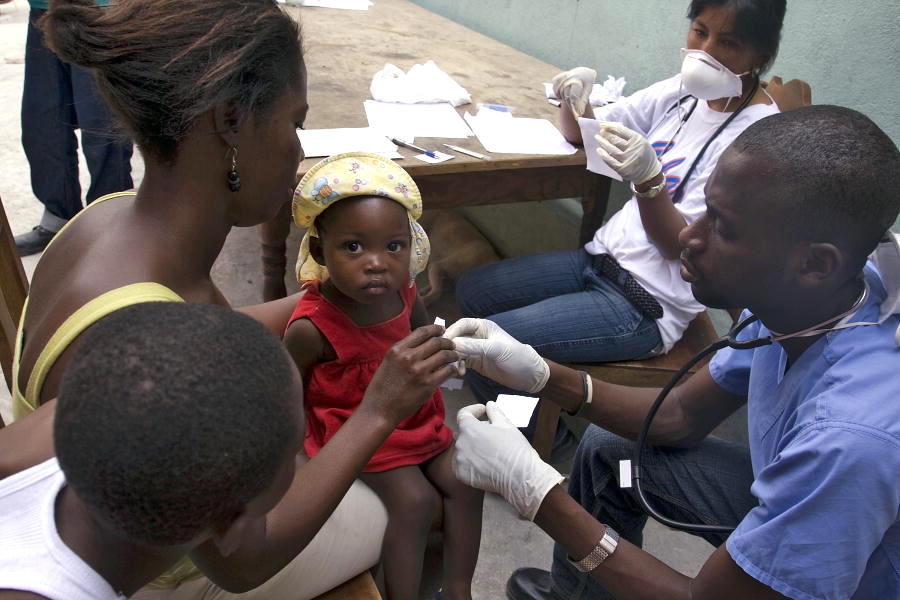
Doctors from a Cuban-Haitian medical brigade treat a young woman and her child in Port-au-Prince, Haiti. Formed in 2009 when Cuba sent some 1000 doctors to support the Haitian Ministry of Health, the brigade was tasked with emergency relief work. (UN Photo/Pasqual Gorriz)
Despite its achievements, Cuban healthcare still faces serious, life-threatening limitations due to the economic blockade. CIM, for example, has struggled to find international companies willing to carry out vital services for them.
Claudia Plasencia, a CIM researcher, explained during the conference that CIM had signed a contract with a German gene-synthesis company which later backed out because it had signed a new contract with a U.S. company.
“They could not keep processing our samples, they could not keep doing business with Cuba,” Plasencia said.
Arzola, the other CIM researcher, explained how it is virtually impossible to purchase top-of-the-line equipment due to trade restrictions.
“A flow cytometer is a machine that costs a quarter-million dollars … even if my lab has the money, I cannot buy the best machine in the world, which is from the U.S., everyone knows that,” he said.
Even if CIM were to buy such a machine from a third party, it still needs repair services from the United States.
“I cannot buy these machines even if I have the money, because I would not be able to fix them. You cannot spend a quarter-million dollars every six months [buying a new machine] … even though you know that this [machine] is the best for your patients,” Arzola said.
I spoke to Marianniz Diaz, a young woman scientist at CIM. When asked what people in the U.S. could do to help CIM’s scientists, her answer was straightforward: “The principal thing you can do is eliminate the blockade.”
“I would like us to have an interaction without restrictions, so we [Cuba and the U.S.] can share our science, our products, [and] our knowledge,” she said.
Natalia Marques is a writer at Peoples Dispatch, an organizer, and a graphic designer based in New York City.
This article was produced in partnership by Peoples Dispatch and Globetrotter.
Support CN’s
Winter Fund Drive!
Donate securely by credit card or check by clicking the red button:


I wonder if Cuban researchers could develop a vaccine against mass STUPIDITY. The US could never stand a country or a person doing better than it. Yet it is the US that keeps setting the worst examples around the world.
The US has shown its willingness to put people’s health care at the bottom of its list of priorities on many occasions. It considers people, in particular individuals, unimportant and expendable, regardless of where they are in the world.
The only exception to this rule is if an US company profits from it. To them, health problems = profits.
Applause to CN and Marques for her observations.
I think it pays to recognize that nationality is less a motivator for rulers’ actions than it was. Self-interest was always primary, of course. But as the relative power blocs become more international, in general, the links between national and personal self interest in leaders become less closely related.
So here, of course the blockade of Cuba damages health care interests in the United States. The States has turned down Cuban aid during emergencies, despite the fact that Cuban health care is now rated more highly than American health care even without accounting for the differences in cost.
Medical care, pharmaceuticals, and the nominal non-pharmaceuticals called “drugs” are held at artificially high prices in the US by government action to reduce access.
I am very impressed with how Cuba MEDICALLY treats its citizens—-much better care than the USA has. In fact Cuban doctors help nations around the world—-but sadly America seems to spend more money to bomb and blow up more people on the planet. A person would think that with all the US spends on its military, that the rest of America would be treated as well too—-What America was said to be—Land of Freedom—- ends up being more of a Simon Legree place for the nation’s healthcare.
Excuse please crudeness of this comment…
Repaired vehicle of native Cuban US immigrant… his description of his former land (pre Castro) similar to that of a famous Hollywood film: “American whorehouse”.
Tnx One More Time CN Ms. Marquez for Truth Outing…
Timmy Thomas says it best:
hxxps://m.youtube.com/watch?v=KYx2uZRlJCk